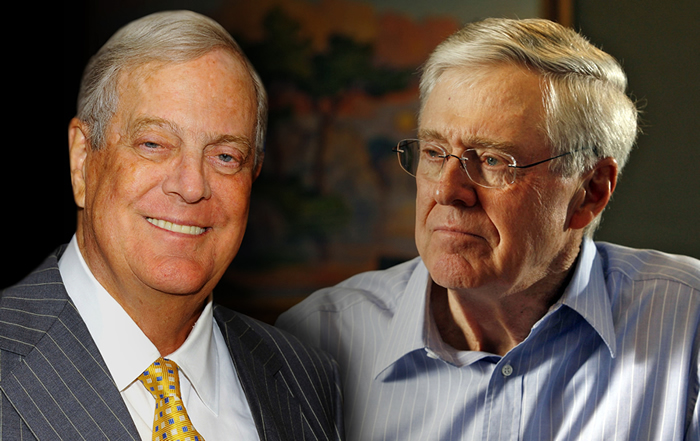 |
| Koch Brothers |
Charles G. Koch, CEO of Koch Industries Inc. (KII), and younger brother William I. Koch, president of the Oxbow Corporation, pursued each other through thirty years of mutual conspiracy accusations that ultimately centered on the oil industry’s ability to influence government actions through campaign contributions.
Control of Kansas-based KII, the second-largest privately held company in the United States, was divided in 1967 among the four sons of ardent libertarian Fred Chase Koch: Frederick (b. 1932), Charles (b. 1935), and twins David and William (b. 1940).
In 1983, KII bought the shares of William, Frederick, and their allies following a 1980 attempt to oust Charles as CEO. Dissatisfied with the deal, William eventually brought more than two dozen legal actions for fraud, conspiracy, and racketeering; most failed.
  |
Internal KII beliefs that William’s conspiracy charges were themselves part of an anti-KII conspiracy gained support in July 1999, when the New York Times reported that William hired private investigators to pose as journalists to get inside information from KII.
William Koch’s only successful lawsuit was a Qui Tam action—an individual suit on behalf of the federal government—charging that Koch Industries had conspired to steal oil from Osage lands. This suit followed a 1988 Senate investigation that was dropped at the behest of Republican senators Bob Dole and Nancy Kassenbaum of Kansas, Don Nickles of Oklahoma, and Democratic senator David Boren of Oklahoma.
Using Federal Election Commission (FEC) data, an article in the Nation asserted that all four were beneficiaries of Koch political contributions; the article also alleged that a 1989 FBI case summary said there was probable cause to prosecute KII (Perry). A 1999 jury trial found KII guilty.
Questions of political influence arose again in a 1998 Senate investigation that suggested that Charles and David had evaded campaign spending limits in 1996 by funneling $1.3 million through the Economic Education Trust (EET) to conservative consulting group Triad Management Services. No subpoena was issued for EET’s financial records, and the New York Times alleged that Senator Nickles blocked further investigation.
In legitimate campaign financing, KII became the second largest political contributor in the energy industry in 1997–1998, with 90 percent of its donations going to Republican causes. Self-styled “Renaissance Man” William was the forty-sixth largest source of Democratic soft money in the same time period, putting him in a league with Bell Atlantic and Federal Express.
Party rivalries came to a head shortly before the 2000 elections. In August 2000, KII was indicted on ninety-seven felony counts for violating emission standards for cancer-causing benzene at its Corpus Christi, Texas, oil refinery.
While the Al Gore campaign told the Washington Post that KII’s environmental performance showed how the oil industry was buying influence with then-governor George W. Bush, the Daily Oklahoman argued that the indictment had been timed to discredit the Bush campaign. In April 2001, the charges were reduced to a single count, and KII agreed to pay $20 million in penalties.
Although a terse joint memo, dated 25 May 2001, announced the end of all litigation between KII and the Oxbow Corporation, the 1983 buyout cast a long shadow. In January 2001, former Playmate Anna Nicole Smith sued KII for conspiring with her stepson E. Pierce Marshall to deny her $474 million in KII stock owned by her late husband, J. Howard Marshall II.
The elder Marshall had disinherited son J. Howard Marshall III for backing William in 1980. In earlier legal battles over the estate, a probate judge was removed from the case for having previously taken trips that were partly funded by a Koch foundation as part of a judge education program.